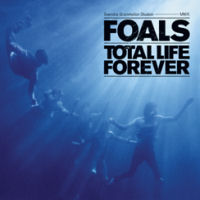
Foals
Total Life Forever
(Sub Pop; 2010)
By David M. Goldstein | 17 July 2010
Foals’s early singles suggested a mathematically precise version of the Rapture with a British drill sergeant on vocals; songs like “Cassius” and “Balloons” being an advanced calculus-type of dance-punk that while rather impressive from a technical standpoint, were rendered somewhat annoying by the simplistic bark of frontman Yannis Philippakis. But they made waves (and won serious coolness points from this critic) by notably refusing to kiss Dave Sitek’s ring when they rejected his final mix of their debut album Antidotes (2008), and their chops were advanced enough to think that they might have some semblance of a future if they ever chose to apply them to full-fledged songs as opposed to shouted rhythm exercises.
The best hope for a future Foals direction seemed to lie in Antidotes‘ third single “Olympic Airwaves,” a song that was smoother and less frantic than those that preceded it, shot through with an atmospheric keyboard wash in addition to pinging harmonics that sounded like they were bouncing off a mirror. And in essence I just described Total Life Forever kick-off track “Blue Blood,” albeit with one crucial difference: somewhere between albums one and two, Philippakis learned to sing.
This development has greatly increased the enjoyment of his band, if only now because Foals’ songs are allowed to breathe. Philippakis still sounds distinctly British, employing that time-honored, sad boy croon not unlike that of Morrissey or Robert Smith, only less suicidal. The new-found emphasis on melody coincides with a conscious decision on the band’s part to play up their atmospheric side, with reverb-heavy washes of sound taking precedent over bludgeoning rhythms; songs like the six minute single “Spanish Sahara” and “Afterglow” shun instant gratification, instead gradually building to dizzying peaks and cacophony few thought this band capable of.
That said, the back and forth duels of the band’s eerily precise funk riffing remains, though they’re thankfully no longer dropping song titles like “Mathletics.” The guitars don’t so much rock out as bounce and refract like lasers on a glass surface, with a crispness that’s likely impossible to recreate outside of the studio. The stuttering funk under the title track’s fantastic chorus is so herky-jerk that it practically forfeits its appeal by being extremely difficult to dance to, unless your style of choice happens to be the Robot. Yet, despite Foals’ continued interest in angular riffing with its roots in math-rock (Philippakis and drummer Jack Bevan once played in defunct math rockers the Edmund Fitzgerald, the band has cited Don Caballero as a major influence), they no longer sound like a caffeinated DFA-signing. More accurate descriptions would include Gang of Four re-envisioned as shoegazers, or the one track on every Cure record (e.g. Wish‘s [1992] “Wendy Time,” Kiss Me, Kiss Me, Kiss Me‘s [1987] “Hot! Hot! Hot!”) where Smith attempts to get his swerve on. Not everything works, however—“Miami” is clumsy Duran Duran pastiche, and “This Orient” basically re-writes Bloc Party’s “Blue Light,” which still means it’s a better song than anything Bloc Party have released in the past five years.
If there’s one record that Total Life Forever immediately calls to mind, it’s fellow Britons the Horrors’ Primary Colours (2009). Not because the two records sound anything alike (they don’t), but both represent surprising, second album evolutionary leaps from bands that made necessary changes in the name of career longevity. With Total Life Forever, Foals have objectively identified the shortcomings (shouted vocals, claustrophobic song structures) of their first album, and erased them while keeping their trademark mathematical riffing intact. In doing so, they’ve left themselves numerous directions with which to pursue album number three, and I’m extremely curious to see how they call pull off this precision onstage.





